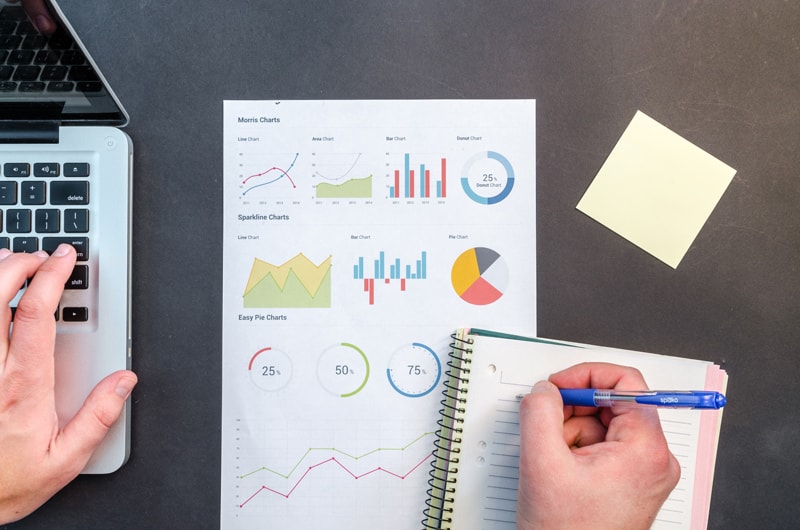Fancy yourself a forex trader? We’re sure you have a lot on your mind. Here are short and sweet answers to 17 of the most common questions about forex trading for beginners that can help you decide whether the FX markets are for you.
- I don’t know anything about how to trade forex. How do I get started?
It’s as easy as opening an account with an online trading platform. Just fill in the form, wait for the verification, and you’re good to go as soon as your account is open. You’ll need to fund your account to get started. Whatever amount you intend to start with, don’t lift a trading finger without first preparing your trading plan.
- Are there forex trading headquarters just like the stock exchange, and if so, when are the trading hours?
The forex market does not have a building or a brick-and-mortar office, although the biggest trading centres are New York, London, Tokyo, Singapore and Hong Kong. Much of forex trading occurs on electronic systems as well as in the over-the-counter (OTC) market where all the licensed brokers, banks and traders are connected.
This also means that forex trading takes place 24/7, because there is always a forex market open somewhere in the world, at least from Monday to Friday.
- What’s the difference between a retail trader and an institutional trader?
A retail trader is an individual trader, while an institutional trader is a corporation, a bank or a large fund.
- Just how risky is forex trading?
While all types of trading and investment have their share of risk, forex is considered riskier than most because it involves leveraged trading, which means it’s possible for you to lose more money than you have in your trading account.
- What’s leveraged trading?
Leveraged trading is when you borrow money from your broker to trade currencies. In using leverage, you will only have to pay an upfront security deposit in case you incur any losses. This allows retail traders to earn even from small currency movements, as well as to take bigger market positions on a relatively small amount of capital.
- Why should I trade forex instead of stocks or commodities?
The currency market is the world’s largest and most liquid financial market, with a daily trading volume of USD5.3 trillion. It’s also the only market that operates round the clock. There are more than 170 currencies you can trade in the forex market, which is 12 times bigger than the futures market, and 27 times bigger than the stock or equities market.
- What are the most popular currencies for FX trading?
The seven most popular currency pairs are called “the majors”, and more than 85% of the world’s forex transactions involve them.
- EUR-USD
- USD-JPY
- GBP-USD
- AUD-USD
- NZD-USD
- USD-CAD
- USD-CHF
As part of almost 90% of the world’s trades, the USD is the most traded currency. Apart from the majors, other popular trading currencies include the Mexican Peso (MXN), which is the eighth most traded; and the Chinese Renminbi (CNY), which is the ninth. The popularity of Bitcoin was likewise on the rise in the first half of last year.
- How do I know which currencies to trade?
Just because the majors are the most popular pairs doesn’t necessarily mean that they are the pairs you should be trading. Traders need to do a lot of research and study before trading, and the currencies they should be trading are the ones they are most familiar with or know the most about.
- What’s a pip?
A pipis the basic unit used by forex traders to measure movements when trading currencies. For example, for EUR/USD, 1 pip is 0.0001.
- What’s a market spread?
A spread in the forex market is difference between the bid price and the ask price in a currency pair. This difference is measured in pips and is usually used by brokers to calculate their compensation for a transaction.
- How do I know when to enter or exit?
Figuring out when to enter or exit a trade, is arguably one of the most important skills that you have to master as a forex trader. The decision to enter or exit must be made objectively and free of any emotional influence. You can base your decision on price levels or technical formations which can be read from charts.
Your entry and exit can be planned out in advance according to your trading plan or strategy. Generally, it would be best to keep your trades small, and enter your position gradually, or commit your assets a little at a time over a certain period. This way, you can limit your risk, as well as the losses should you choose the wrong entry or exit point.
- What’s a stop loss and how do I use it?
A stop loss is a trade management technique that predetermines when you exit a losing trade, to keep you from losing more money. While losses are inevitable in the course of forex trading, stop losses put you in control of the situation by allowing you to decide what to do when the situation isn’t going your way.
You can decide your stop loss point according to the percentage of your account that you’re willing to risk, prevailing market conditions, price volatility, a time limit, or support and resistance levels on charts. If you’re totally new to forex trading, it’s highly advisable to receive expert training and advice on including stop losses in your trading plan.
- What’s the difference between CFDs and Spot Trading?
A CFD, or Contract for Difference, is an agreement wherein every time you close a contract, you will be paid for every pip that the currency you bought has moved in your favour. If the currency doesn’t move in your favour, however, you will be the one to pay.
CFDs are so-called because every time you close the position, what you take is the difference between the closing and opening price. That difference will either be added to or deducted from your account. Take note that you never actually own the currency you buy, whether virtually or physically, and that you will never have to deliver the currency you sell.
A Spot Trade, on the other hand, involves the actual exchange of currencies, either virtually or physically. This means that if you buy or borrow a currency overnight, you will either pay or receive interest on it.
- What are binary options and how are they different from forex trading?
Binary options are contracts with fixed risks and rewards, where the trader predicts whether an asset (or specifically in forex trading, a currency) will go up or down during a certain time frame. The trader can see, right away, what value their earnings will have if their predictions come true. You get all your money back along with a return if your prediction pans out, and lose all the money you risked if your prediction doesn’t.
Both binary options and forex trading can be done online and can be undertaken with small amounts. The difference between them lies in how much profit you can earn in the long run. With binary options, you need to make more correct predictions in order to make significant gains. The transaction costs (spreads on binary options) are prohibitively expensive in the long run.
Forex trading, on the other hand, allows you to set your own profit targets and stop loss orders, which means you can still earn profits even if your predictions are mostly incorrect.
- What is technical analysis?
Technical analysis is a method that uses charts as a tool for making informed trading decisions. These charts present information such as volume and price movement, and by analysing this information, forex traders are able to speculate on how strong or weak certain currencies are, and make forecasts on future movements.
- How do I know my trading plan is working or when to change strategies?
As with any plan, results are the only way to gauge your forex trading plan’s effectiveness. However, these results must be consistent over a significant period. Just because your strategy worked a couple of times, doesn’t make your plan fool-proof or a guarantee of long-term success.
- Where can I get help to improve my forex trading game?
There are a lot of helpful educational materials available online (most of it for free), as well as real-time, up-to-date market information from providers such as Bloomberg or DailyFX. You can find forex trading basics and more advanced advice such as technical analysis techniques, but make sure that the organisation offering the information is reliable, and, if it’s a financial service provider, duly licensed.
You can also “practise” with play money using a demo account offered by some trading platforms, and build up your confidence along with your experience before risking real money. But instead of navigating unexplored territory without a guide, or learning through costly trial and error, you would do well to undergo training from professional traders with decades of experience and a proven track record of market successes.
At TrackRecord, you will benefit from the experience and expertise of professional traders who can show you how to trade better and profit consistently regardless of prevailing market conditions or your current skill level. Check out our list of free resources and courses suitable for your needs today.
Sources:
https://www.cityindex.com.sg/forex-trading/start-forex-trading/
https://money.stackexchange.com/questions/45576/what-is-the-difference-between-spot-forex-trading-and-cfd-forex-trading
https://www.valuepenguin.sg/basic-guide-forex-trading
https://brokernotes.co/forex-trading-industry-statistics/
https://www.financemagnates.com/binary-options/bloggers/binary-options-vs-forex-trading-understanding-the-difference/
https://www.ig.com/sg/forex/how-to-trade-forex
https://admiralmarkets.com/education/articles/forex-basics/what-are-the-best-currency-pairs-to-trade
https://www.forextraders.com/forex-education/forex-strategy/trade-timing-entry-exit-points/
https://www.babypips.com/learn/forex/stop-loss-whats-that
https://www.investopedia.com/terms/t/technicalanalysis.asp
https://vantagepointtrading.com/5-step-plan-forex-trading-success/
https://www.oanda.com/forex-trading/learn/getting-started/pips
https://www.investopedia.com/ask/answers/06/pipexplained.asp
https://www.financemagnates.com/executives/insights/what-is-a-spread-and-why-does-it-matter/
https://www.babypips.com/learn/forex/news-and-market-data



